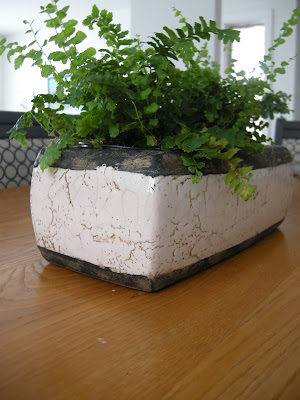For many of us these words conjure up a dining room set with everything matching, a chandelier and some sort of hutch or maybe buffet. Probably a picture of some sort will be included. I bet matching is the most obvious characteristic.
It doesn't have to be that way unless that's what you like.
Here are 5 ways you can make your dining space stand out a little.
Mix and match your chairs and table
The days of dining sets have moved behind us. In many magazines you will see all sorts of mixing of styles, materials and colours. I love the look of upholstered chairs with a wood table. They soften the hard edges and provide some relief in the "wood" department. Some adventurous types will go for two different styles of chairs.
Adore magazine
Another option if you aren't too adventurous is to upholster each of your wooden chairs with a different, but co-ordinated fabric. Note how this room sports more traditional chairs with a very simple table.
In the case of my own dining space, I painted my matching chairs charcoal and upholstered them with a much lighter fabric to make them the centre of interest in my sea of golden tones. I am trying to get up enough nerve to paint the solid ash buffets the same colour. I'm not there yet. It's difficult when your furniture is all hand made with love.
Look for a harmonious buffet
Forget about having a matching buffet (I wish I could!). Look for one with the same undertone as your table or chairs and similar lines if you like, or go for something painted or a different style entirely. Some element of it should relate it to the room as a whole: wood tone, style, or colour of other objects in room.
Here are two I would choose for my space to work with my chairs.
They certainly harmonize with the darkness of the chairs, the style is mid centuryish like the table and I like the fact they are both raised off the floor. This openness will give the illusion of space, always an added plus in a small room.
Have at least one hand made/original item
We live in a mass produced economy where the answer to everything is in a big box store. Not so. Save your pennies, visit an antique shop, a fine craft store or gallery. Look for something you love, made by the hand of an artist, and place it with pride knowing it's unique. It doesn't have to be large.
This month I have a lovely pot on my buffet created by an artist friend, Anita Singh. I love her work
because it always relates to the natural world. Barnacle is always a conversation piece. It is also the perfect example of my next point. Use a variety of textures
Textures make the most interesting addition to spaces, and it is the element that I see under-utilized in homes. In my space I have silk drapes, lots of wood grain, a highly textured plant container made from ceramic, a white wavy vase, metal candlesticks with mother of pearl, and two plants. I love texture!
Choose one unexpected element
Right now the pot my ferns are in is my an unexpected item. It is so rough and worn looking and I have it paired with silk drapes. Other options could be your light fixture, a painting, something on your tabletop or a small piece of furniture in a corner. Some would say it should have bling, but I'll leave that up to you.What's your "interesting " score?
This is a very arbitrary checklist, based on what is "current" in my decor reading and viewing. Hardly scientific!No my dining room isn't perfect but hopefully it is interesting.
Just because I write about design doesn't mean my space is perfect (whatever that means) or that it even lives up to what I know about the elements and principles of design. There's the small matter of competing priorities including: budget, interest and energy, connections to objects and furniture, beliefs about your role consuming and junking, and the desire for good old predictability in your environment etc.



















No comments:
Post a Comment